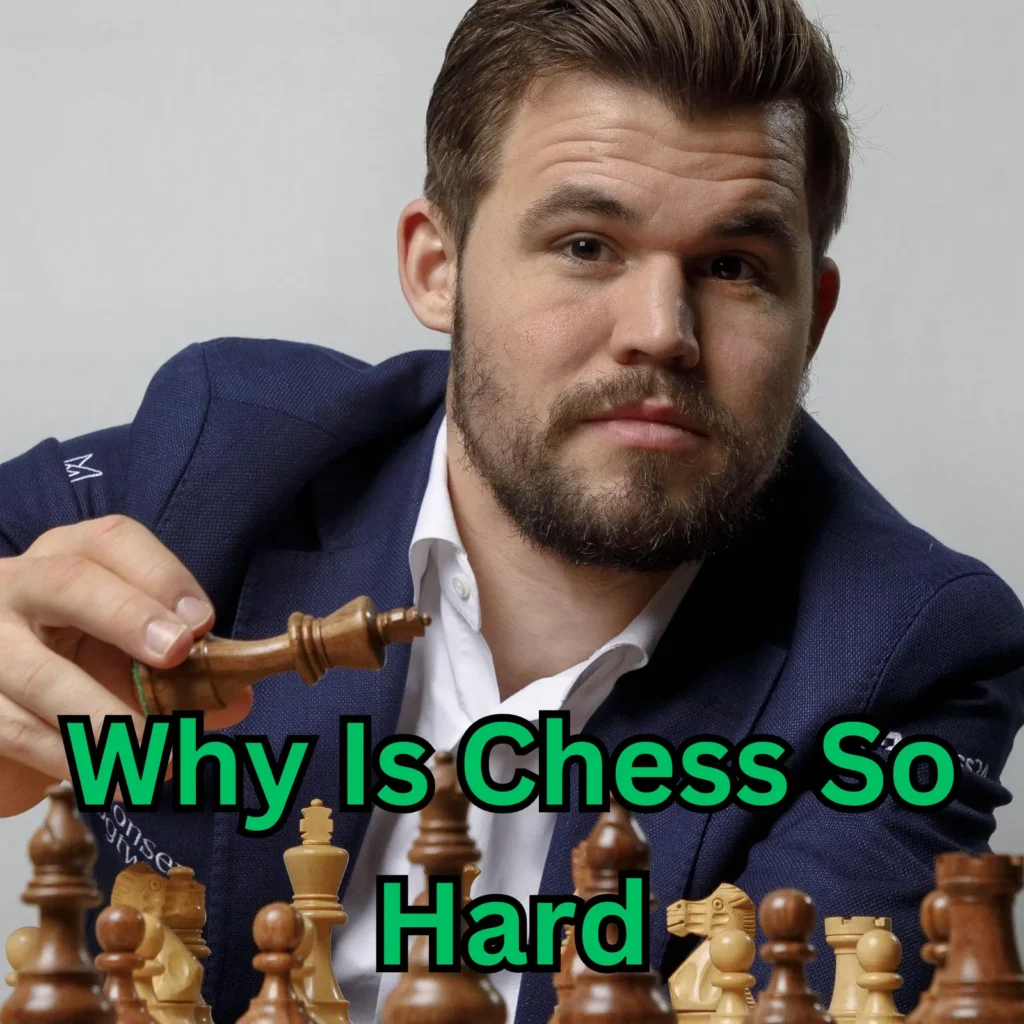Introduction
Chess is a game that has been played for centuries now, it has captivated the hearts and minds of many thought the years with its intricate mix of strategy and skill. While some people only see chess as a hobby some dedicate their lives to honing their skills and become professional players.
This speaks volumes about how hard Chess can be, you don’t see people become pros at children’s games like rock, paper and scissors for example. The game is extremely complex with potentially infinite moves, complex rules and multiple pieces each with their own move sets.
In this article we are going to explain a bit better the intricacies of chess, why it can be so challenging and why some people dedicate so much time to it. We hope that by the end of this article you too can embark on your own chess journey, it can be a very fulfilling experience even If it is really difficult.
The Complexities of Chess
Alright so we’re kind of stating the obvious here: chess is complex, really complex! But how much are we talking about here?
Well let’s take a look at some numbers: chess is played in a 8×8 board which means there are 64 squares where each piece can move. The game is played by two opposing players on each side of the board, each with 16 pieces. Each piece has its unique movement rules, and there are countless possible moves that can be made at any given time. For example, in the starting position alone, each player has 20 legal moves to make on their first turn.
If you thought that 20 moves were a lot then hold on to your seats! Every time a player makes a move the number of possible moves increases exponentially. This means that in a match between humans (and computers actually!) no one can really calculate ahead enough to known which move is better all the time.
This means that intuition and prediction are king when deciding which pieces to move, most players when they start out playing chess will quickly identify certain moves and pieces that are critical to winning the game, but in reality, every single piece of the board is critical when playing at the highest level.
If this wasn’t enough there are complex rules which can increase the game’s difficulty, from en passant to checkmate limits the game can be a bit difficult to grasp at first.
The Mental Demands of Chess

While the game of chess itself is difficult it also places a lot of stress on each player’s mind. Chess really hammers into the intellectual ability of both players, planning ahead and thinking with a strategic mind are paramount for success on the board. But players can’t just execute well and expect to win, they must also adapt to their opponent who was for all intents and purposes the same pieces as they do at least at first.
Keeping track of every piece on the board is another great skill that the best players in chess have, they can remember the position of most pieces from their opponent and theirs even with their eyes closed! It’s an amazing thing to see when you see it for the first time, these players are so used to remembering and planning ahead that they can “see” the board in their head.
Moreover, a player must be able to adjust their strategy and plans on the fly, as unexpected moves by their opponent or unforeseen circumstances can quickly change the course of the game. This flexibility and adaptability require a lot of mental agility and the ability to think creatively and outside the box. Being predictable and going by the book will only get you so far.
If you think chess is just another board game then you have never really pushed yourself past your limits, most seasoned chess players know how taxing it can be on their brains to play against a strong opponent. Sometimes depending on their day job, people can lose this ability to deeply focus and think about something, but in chess it’s the only thing that will enable you to compete against strong players.
The Skill and Experience Required
Not only is chess a complex game that requires intense focus and effort to play, it also requires time and practice to succeed. Like any sport, game or skill the best chess players are those that are not only talented but also very hardworking. Training and practice might not be as fun as just playing, but they’re an integral part of why all of the best players in the world are so strong in the first place.
Elite players have a better understanding of the game, are more adept at recognizing patterns and potential moves, and can analyze all kinds of positions better. A player must also develop specific skills to play chess successfully, such as the ability to calculate potential moves, recognize and respond to threats, and execute effective strategies. These skills are not easy to acquire and require significant practice and dedication to develop.
Besides the technical aspects of becoming better, most strong chess players have intense determination and grit, it can be stressful and tiring to go all out on a simple board game, but that is indeed what you must do if you want to improve at chess.
The Benefits of Playing Chess Despite Its Difficulty
After reading all this, you might be wondering is chess worth it to learn? The answer is simple: yes, it is!
Despite how hard it can be to become a strong chess player, it has immense benefits for the mind. Chess has been shown to increase memory, concentration and problem-solving skills useful in all kinds of things through life (this is why some schools implement a chess program for their kids).
I always recommend parents to consider adding chess to their kids’ activities, they don’t need to take it super seriously but it can be a great source of parent-child bonding and become a main hobby for them if they learn to love the game, otherwise it’s still a great thing to learn for most kids.
This goes double for very introverted kids, as they can often feel isolated and left out when participating in other social activities. Chess can provide a safe environment where all the focus is on the game and only occasionally on socializing. This can help these kids make lifelong friends and can boost their self-esteem.
Finally, playing chess can be a source of enjoyment and satisfaction. The satisfaction of executing a well-planned strategy or the thrill of a hard-fought victory can be immensely rewarding and provide a sense of accomplishment.
How To Introduce Someone to Chess

Introducing someone to the game of chess can be a fun and rewarding experience for both the teacher and the student. However, it is important to approach the introduction carefully, as chess can be overwhelming for beginners. Here are some tips on how to introduce someone to chess:
Start with the basics first: Don’t jump ahead to complicated rules and intricate strategies, focus on the fundamentals and work from there, everything else will come with time.
Use visual aids: Like with other games like poker and such, visual aids like those which show how pieces move can be amazing when someone can’t remember how every piece moves. You can find many of these online for free too!
Play practice games: Start with simple practice games that focus on the basic concepts of the game. These games should be fun and engaging, and help the beginner develop a feel for the game without becoming frustrated.
Encourage questions: Encourage the beginner to ask questions and provide answers in a clear and understandable way. Be patient and take the time to explain difficult concepts or moves.
Emphasize the fun: Chess can be a challenging game, but it can also be a lot of fun. Emphasize the enjoyment that can be derived from playing chess, and encourage the beginner to experiment and try new strategies.
Provide resources: Once the beginner has a basic understanding of the game, provide them with resources such as books, online tutorials, and chess software that can help them improve and develop their skills.
By following these tips, you can help introduce someone to the game of chess in a way that is both enjoyable and informative. With practice and dedication, anyone can learn to play and enjoy this fascinating game.
Conclusion
While from the outside chess can seem unforgiving and even cruel, the challenging nature of the game can be an immense benefit to anyone daring to jump in and learn how its done. The complexity, the mental demands and the skills required to be good at chess can easily transfer to most parts of our lives.
While we’re not suggesting chess is the ultimate cure to everything, I sincerely believe the world would be a better place if more people played chess. It can also be a humbling experience honestly.
